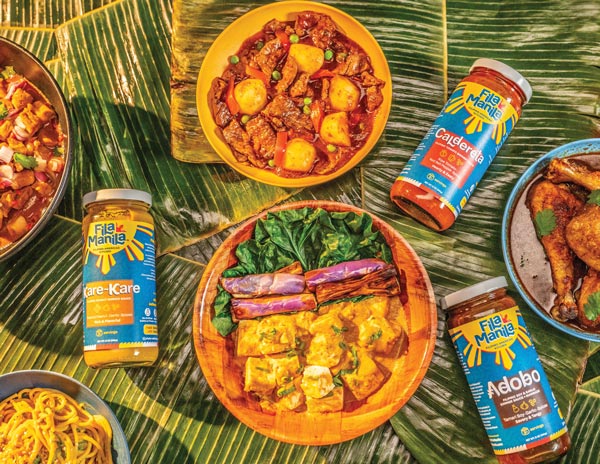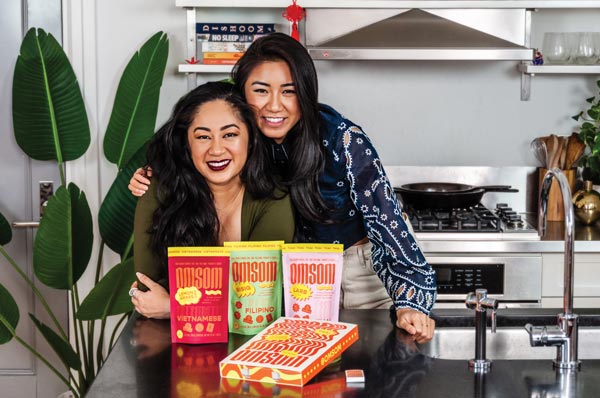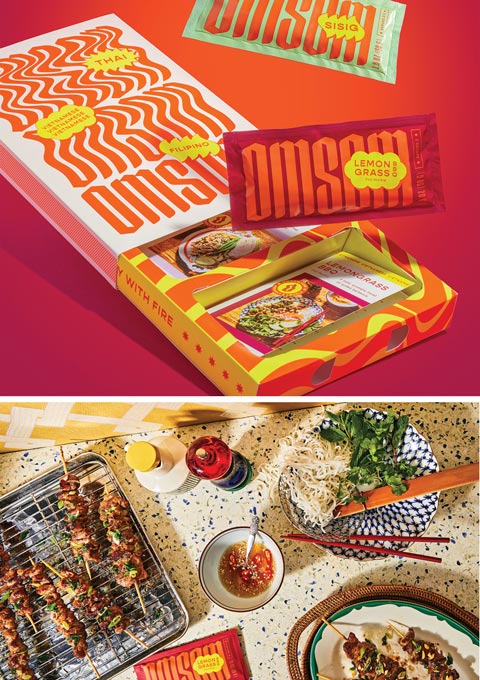
THE unprecedented global health crisis brought by the pandemic has somehow forced many people to go back to their kitchens and either cook or bake and this presented an opportunity for some business-minded folks to come up with something new to offer the market.
Meet the first-generation Asian American risk-takers who decided to move forward with their ideas, despite the many challenges and unknowns, and introduce new products in these uncertain times.
Home-style Filipino cuisine is delicious, heartwarming comfort food that our parents (or anyone in the family for that matter) would cook every day. Jake De Leon, founder of Fila Manila and a Filipino American, had always hoped that one day, more people can experience that same joy and delight.
Now, he hopes to ignite and highlight the unique and delicious flavors of Filipino cuisine in the United States by way of simmer sauces.
First-generation Vietnamese-American sisters and daughters of refugees, Vanessa and Kim Pham on the other hand are the founders of Omsom, which offers ready-to-use starters that are packed with the specialty sauces, aromatics, seasonings, citruses, and oils — the foundation of a variety of Asian dishes.
The sisters tapped the talents of estimable chefs and restaurant owners to exclusively collaborate on each starters’ formulations and recipes; beginning with a Southeast Asian line of three dishes from Vietnam, Thailand, and the Philippines.

Filipino Simmer Sauces
“I thought to myself, ‘How could this be?’ when Filipinos represent the second-largest Asian ethnic group and immigrant population in the U.S.,” Jake De Leon told the Asian Journal. “Even culinary icons like Anthony Bourdain and Andrew Zimmern constantly praised our food and have said it was on the ‘cusp’ of a breakthrough in the US.”
To start the first mainstream Filipino American food brand has always been a dream for him but he became busy with his first food startup so the idea went to the back burner.
The pandemic happened and it hurt and slowed his first business to almost a halt. Like many other entrepreneurs and business owners, he saw a significant impact on sales so he had to make the necessary adjustments.
“The pandemic gave me a fresh perspective on the impact of Filipino healthcare workers and the time to think during the lockdown as to why Filipinos, and our culture and cuisine, are not widely recognized in the U.S. I then decided it was time to start working on Fila Manila,” De Leon shared.
He put his thinking hat on and thought about what unique items he could offer to the market. He used his stimulus check as seed money and began to work on this project.
De Leon felt that Adobo, Kare-Kare, and Caldereta best represent Fil-Am cuisine and his own family’s cooking. Besides, these three were always on the table at every Pinoy dinner, party, or gathering he went to while growing up in New Jersey.
“I found those would be the dishes that Filipinos would also prepare and share with their non-Pinoy friends. I have several cousins who are RNs who would make adobo for their work potluck and thus introduce our delicious foods to their coworkers,” he said. “I also feel that if you were to go into any Filipino restaurant or food truck, their signature dishes would be some type of variation from Adobo, Caldereta, or Kare-Kare.”
He is hoping that the three sauces become successful and that Filipinos and non-Filipinos both love them, so they could expand the offering. He is looking beyond more simmer sauce varieties, but other food products where folks can experience unique Fil-Am flavors such as condiments, Filipino spaghetti sauce, or even frozen meals or Pinoy ice cream.
De Leon had a career in food marketing working with some of the world’s largest food companies like Procter & Gamble and Starbucks. He eventually made the jump to entrepreneurship where he founded his first food and beverage company, Origin Almond.
Fila Manila is his second startup and says it’s more personal to him because it is a nod to his heritage and culture as a Filipino.
He considers himself lucky being born to parents who come from regions known for their distinct culinary offerings.
His dad is from Iloilo and his mom from Pampanga, both culinary powerhouses in the Philippines. His dad moved to the US in the late 70s to find a job; De Leon, his mom, and an older brother followed in the early 80s. They are currently based in Laurel Springs, New Jersey.
Like many immigrant families, his parents worked several jobs and side hustles to ensure a better life for their children. Growing up, he vividly remembers helping his mom and grandma make lumpia, turon, and longanisa in their kitchen for them to re-sell to friends and family for some extra cash.
He says both his parents are just as obsessed with food as he is so they usually cook homemade Filipino dishes daily. Before the pandemic, he would sometimes go to North Jersey or parts of Philadelphia to shop and eat at Filipino-owned shops.
“One of the reasons I made Fila Manila is so that anyone who may not have access to Filipino restaurants (or parents) can easily enjoy Filipino food themselves,” he shared.
For him, it is also about helping more home cooks to simplify the way they cook just by simply adding the simmer sauces together with protein and veggies of their choice for a simple yet delicious home-cooked Filipino feast. He takes pride in the fact that their sauces use authentic Philippine ingredients like coconut vinegar and they contain no added sugar or artificial ingredients and are naturally gluten-free, and vegan-friendly.
Venturing into this kind of business is deeply personal to De Leon and much of what he brings to the table comes from his memories of Filipino food growing up.
“My interaction with Filipino food has mostly come from my family and friends, so to me, it means comfort and a symbol of love. Yes, I love cheeseburgers, pizza, and sushi-like everyone else, but there’s a certain feeling of ‘home’ when you smell freshly cooked adobo,” he said. “Also, I feel that our food is a sense of identity and pride to the Filipino culture — ours is not Chinese, Thai, or Indian but rather a familiar, yet distinct flavor of many cuisines combined. As the Fila Manila tagline says, we are more than Asian, we are Filipino!”

Southeast Asian Flavors
“We landed on the starter format because we really want to provide the foundation of a dish for home cooks with a level of cultural integrity that has been, disappointingly, hard to achieve until now,” Kim told the Asian Journal. “From there, home cooks can take it home with our recipes or make it their own. We want to not only celebrate these flavors but also empower folks to actively engage with them.”
Given their heritage, the Pham sisters are excited to share their heritage and they chose to cast a wider net and include the larger Southeast Asian story.
In addition to Vietnamese dishes, they opted to include Filipino and Thai flavors.

“Both cuisines have interesting places in the American dining table. Thai flavors, while well-loved throughout the U.S., are often bastardized in their proliferation throughout the U.S. Filipino dishes are quickly growing in popularity, but still largely on the rise for most Americans,” Kim said. “The Philippines, as a country, is entirely unique to the continent of Asia, given its history of colonization, imperialism, and occupation. We wanted to showcase a cuisine + dish that doesn’t nearly get as much love as it should on the mainstream!”
The sisters have chosen chefs and restaurateurs for their deep-rooted connections to each cuisine: chef Jimmy Ly of Madame Vo helped develop Vietnamese Lemongrass BBQ, chefs Chat and Ohm Suansilphong of Fish Cheeks collaborated on Thai Larb, and Jeepney’s owner Nicole Ponseca was the expert source for Filipino Sisig.
“We partner with chefs who are, while lauded and well-loved in the industry, are redefining it in their own right. They have connections to these dishes that run deep but are also on the cutting edge of what it means to eat modern Thai, Vietnamese, Filipino, Korean, Japanese, and Chinese. They are all collectively pushing the future of these cuisines in American – modern Asian food doesn’t have to look “one” way anymore and we’re honored to support folks at the frontier of that thinking,” Kim said.
Omsom starts the process for home cooks to finish with suggested recipes — from aromatic noodle bowls with pork shoulder and fresh herbs (Lemongrass BBQ) and fiery plates of chicken, sticky rice, and cabbage (Larb) to pork belly umami bombs served with garlic rice and sliced chili (Sisig).
The Pham sisters also encourage users to experiment with whatever ingredients they have available/prefer or to accommodate dietary preferences/restrictions.
These entrepreneurs are hoping that the products they created would someday become Asian pantry staple brands that make cooking one’s favorite Asian dishes (with uncompromised flavors and hard-to-find ingredients) easy and possible in any home kitchen.








